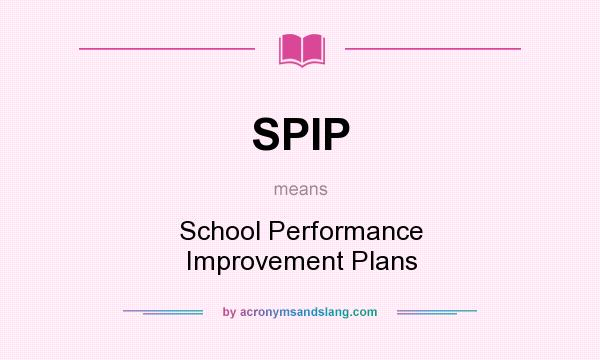School Performance Improvement Plan (SPIP)

SPIP means - School Performance Improvement Plans
School Performance Improvement Plan (SPIP)
The SPIP is a school’s road map that sets out the changes a school needs to make to improve the school’s performance, especially, the level of pupils’ achievement.
The SPIP indicates most pressing activities that will help the head teacher, teachers and the SMC to determine the changes that would improve pupils’ achievement and monitor the process of improvement in the school (GES, 1999)
Introduction
The implementation of the School Performance Improvement Plan (SPIP) through the Capitation Grant (CG) scheme introduced by the Government of Ghana in the 2004/2005 academic year for basic school was introduced to abolish all forms of fees paid by pupils in basic schools with the aim of improving access and enhancing the quality of education.
In the decentralised process in the Ghanaian basic education sector, there are three levels of administration: the Ghana Education Service under the Ministry of Education, Regional Directorate of
Education and the District/Municipal/Metropolitan Directorate of Education. At the local level, the District/Municipal/Metropolitan Directorate of Education, School Management Committee (SMC) and
PTA are the main actors in the implementation of government policies at the basic school level to ensure education quality.
School management boards or committees and parent- teacher associations are formed in order to involve communities in decision making processes in the schools. It is therefore expected that in the education decentralisation process, the involvement of the community through bodies such as SMCs, PTAs and the school teacher/head teachers will improve education quality. These decentralised actors (head teachers, teachers and SMCs) at the local level are supposed to prepare the SPIP to access the CG and implement it. It is expected thatthe preparation of the SPIP will enable schools to provide teaching and learning materials and undertake minor repairs in the school, among others, with the ultimate aim of improving the quality of education.
It is important to note that the Ghana Education Act of 1995, espoused that the SMC is mandated to ensure effective community participation in education and mobilisation for efficiency in schools, hence by
extension the SMC ensures that SPIP improves schools through school management, contribution to school resources and instructional programme in their various communities. Hence, in the context of this
study, the SMC which has a greater role in the education decentralisation process is supposed to hold the school accountable with regards to improving school quality.
Based on this premise, this study finds out how schools prepare the SPIP to access the CG and the challenges they face in implementing the SPIP, with the intention of informing policy and practice of
decentralisation generally and school performance improvement
processes particularly.
The Capitation Grant
The utilisation of the Capitation Grant was designed to empower the schools to effectively use financial resources to plan and carry out school quality improvement activities under the “School Performance Improvement Plan” (SPIP).
School Performance Improvement Plan” (SPIP)
The SPIP is a school’s road map that sets out the changes a school needs to make to improve the school’s performance, especially, the level of pupils’ achievement.
The SPIP indicates most pressing activities that will help the head teacher, teachers and the SMC to determine the changes that would improve pupils’ achievement and monitor the process of improvement in the school (GES, 1999). The SPIP was therefore introduced as a condition for the allocation and utilisation of funds to schools.
The plan is prepared by the head teacher and teachers with the approval of the SMC, this is then forwarded to the Metropolitan, Municipal or District Education Directorate for review and final approval. The SMC has the responsibility to oversee the implementation of the SPIP. It was the expectation of the GoG that the process of planning the activities would be participatory (involving head teachers, teachers, SMCs and PTAs) and transparent.
The grant is therefore, expected to serve as an opportunity to help build school capacity to effectively implement fiscal decentralisation which is a long-term goal of the GoG.
It is also intended to help implement the SPIP to improve the quality of education in schools.
Preparation of SPIP by Schools and SMCs
All schools are supposed to prepare SPIP as a requirement to access the CG grant from the Metropolitan, Municipal and District Education offices across all regions. From the head teachers’ accounts,
the steps used in the preparation of the SPIP were generally as follows:
1. Fixing a date convenient for teachers, SMCs and PTAs to
discuss the SPIP;
2. Listing items needed by the school (e.g., teaching and learning materials) and knowing the unit price of each item and on the meeting day, discussing thoroughly the items to be captured on the SPIP and budget projections for the various items;
3. Estimating the total cost of items to be bought and other expenditures;
4. Vetting and signing of the SPIP by the circuit supervisor, SMC, head teacher and staff secretary/all teachers, as the case might be;
5. Submitting the final SPIP to the District Education Office for approval.




